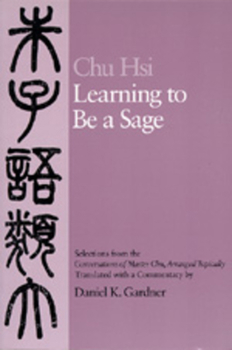Learning to Be a Sage: Selections from the Conversations of Master Chu, Arranged Topically
Select Format
Select Condition 
Book Overview
Students and teachers of Chinese history and philosophy will not want to miss Daniel Gardner's accessible translation of the teachings of Chu Hsi (1130-1200)--a luminary of the Confucian tradition who dominated Chinese intellectual life for centuries. Homing in on a primary concern of our own time, Gardner focuses on Chu Hsi's passionate interest in education and its importance to individual development.
For hundreds of years, every literate...
Format:Paperback
Language:English
ISBN:0520065255
ISBN13:9780520065253
Release Date:March 1990
Publisher:University of California Press
Length:218 Pages
Weight:0.70 lbs.
Dimensions:0.6" x 6.0" x 8.9"
Customer Reviews
2 ratings
An Excellent Guide on Moral Cultivation
Published by Thriftbooks.com User , 20 years ago
In 'Learning to be a Sage' Chu Hsi observes that to be novel and artful are usually the goals of writers, when the real challenge is to be simple and understandable. Daniel Gardner's translation accomplishes the latter. The sayings of the Taoist sage are clear and compelling, assisted with metaphoric examples while not being burdened down by poetics.The book is a meditation on the development of moral character. From beginning to end, Chu emphasizes the importance of education and study to the development of ethical principles. While he begins with a gloss on early education methods, he does not go where so many philosophers of education have: straight to a discussion of pedagogical method. Instead he merely says of teachers that they instruct a student in the beginning and correct him in the end, but that the responsibility of learning is on the student.This responsibility underscores Chu's main recurrent theme in this text, the proper development of moral principle. While he writes much about the proper method of education, his most important discussion is of the proper motives for study. He laments (in complaints as relevent today as they were in the twelfth century) that people read only to impress others and to get ahead politically, not for the personal edification that learning brings.The only drawback to this text is Gardner's commentary. The footnotes are helpful with tricky translations, but the embedded commentaries are distracting and border on arrogant. Rather than letting the reader decide the meaning of a text for himself (in the vein perhaps of a Buddhist koan), Gardner sometimes interjects that the meaning of a passage is unclear. Perhaps he ignored Chu Hsi advising to abandon preconceptions when reading. Normally one could well ignore distracting commenatry, but in this text it is not typographically distinct enough to be distinguished with ease.This is a good text even for non-Taoists and those totally unfamiliar with the Way. It is a solid meditation on proper self-education and personal development for its own sake.
Terrific translation of sayings of a brilliant philosopher!
Published by Thriftbooks.com User , 24 years ago
Chu Hsi (pronounced like "jew shee") is almost unknown in the West. However, he is widely recognized in East Asia as one of the most brilliant and influential Confucian philosophers of all time. Chu Hsi's interpretation of Confucianism became the basis of the civil service examinations in China in the early 14th century A.D., and remained so until the examinations were abolished in the early 20th century. Consequently, generations of intellectuals memorized Chu Hsi's views.Gardner has done a terrific job translating selections from "The Conversations of Master Chu, Topically Arranged," a collection of Chu Hsi's sayings recorded and organized by his disciples. Gardner has translated a part of the massive "Conversations" dealing with methods of ethical cultivation. Gardner supplements these selections with excerpts from Chu Hsi's metaphysical comments. This is very helpful, since Chu Hsi's views on cultivation are connected to his metaphysical views. Gardner is a well respected scholar of Chu Hsi, and his introduction helps situate Master Chu historically. People who are interested in Chinese philosophy usually go to the obvious places: the sayings of Confucius, the Tao Te Ching, or the Yi Ching. Why not read something by a figure as influential as Confucius, but less well known, and perhaps more accessible?






